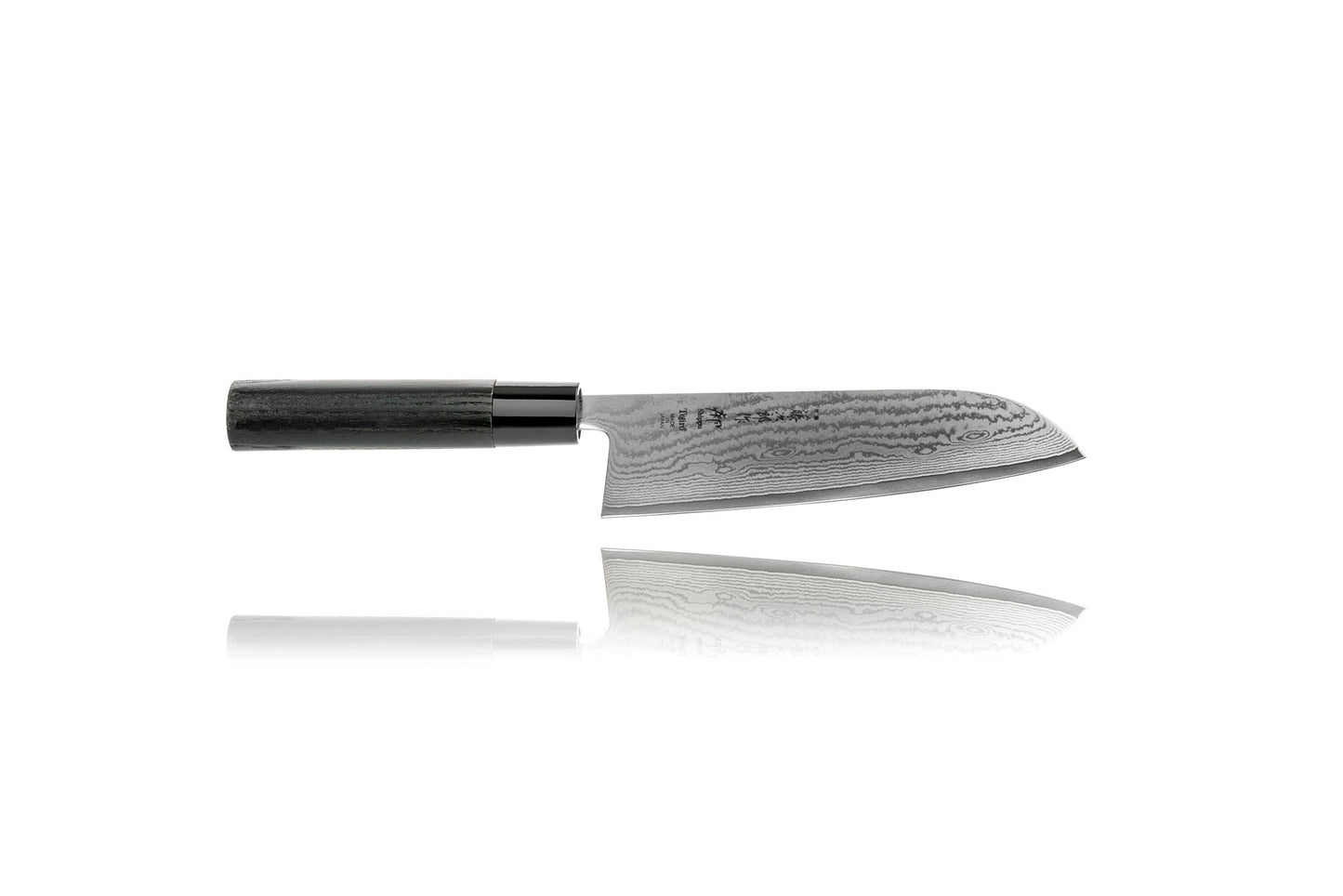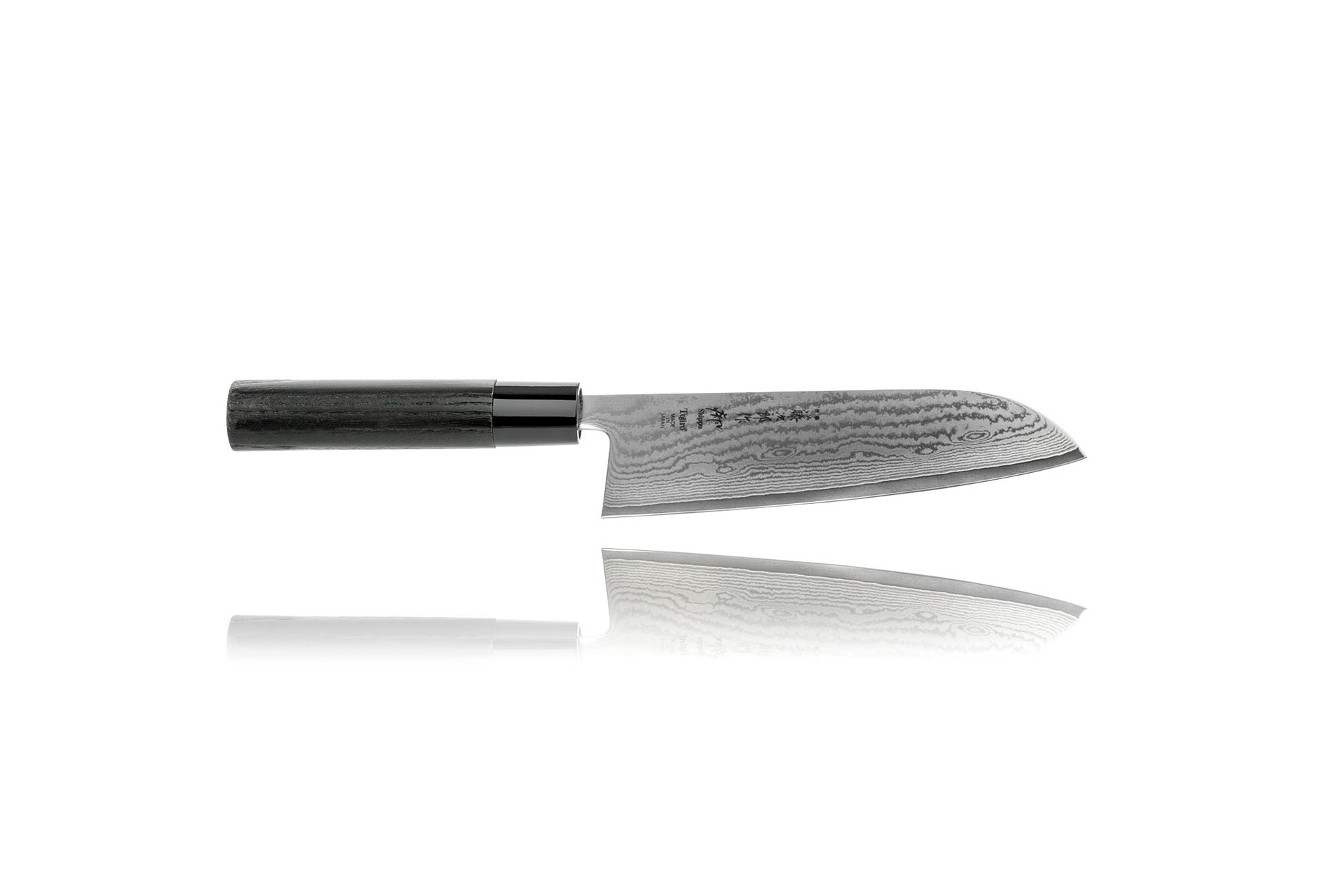Tojiro Shippu Santoku
Tojiro Shippu Santoku
In stock
Couldn't load pickup availability
Share
Shippu is Tojiro’s flagship line of traditional Japanese knives and features premium forged Damascus steel blades and fire-blackened chestnut wood handles, all handmade in Tsubame, Japan and imported exclusively by Seattle Cutlery. Slightly harder and lighter than the Tojiro Zen series, the razor-sharp blade is hafted to a handle of fire-blackened chestnut wood to create an elegantly simple, supremely functional knife.
Function
Function
The santoku bōchō (三徳包丁) is a Japanese chef’s knife that combines the best features of the gyuto, the Western-pattern chef’s knife, and the nakiri, the Japanese vegetable knife. Its name, which means “knife of three virtues,” can refer either to its ability to cut meat, fish, and vegetables, or to the three functions of slicing, chopping, and dicing. The broad blade and gently curving edge, much like the nakiri, allow it to chop and dice produce more easily and comfortably than the gyuto. The downward-curving tip, a compromise between the square end of the nakiri and the narrow tip of the gyuto, facilitates fine cutting without sacrificing any chopping power.
Blade
Blade
Tojiro Shippu and Shippu Black blades are forged from 63-layer (all larger knives) or 37-layer (paring, peeling, and petty knives) Damascus steel, which is made by repeatedly folding and forge welding two stainless steels with different carbon contents. The resulting material bears the elegant, wavelike pattern produced by its many fine layers—a testament to its strength, flexibility, and durability. This Damascus envelops a core of harder VG-10 cobalt alloy steel, a high-carbon stainless steel developed in Japan. Hardened to HRC 62, it accommodates a long-lasting, razor-sharp edge.
Damascus steel was first developed in India over 2,000 years ago and quickly established a reputation not only for its beauty, but also as one of the greatest metallurgical innovations in history. Swords forged in Persia and sold in the Syrian city of Damascus inspired legends of their ability to slice through a gun barrel or part a hair falling across the blade. Although the ancient technique was lost to history around 1900, modern metallurgists have succeeded in reproducing the effect with state-of-the-art alloys to bring performance to the next level.
Handle
Handle
The handle is crafted from lightweight chestnut wood, which provides a secure grip without upsetting the knife’s balance. The wood is fire-blackened, enhancing its durability and water resistance, and secured with a ferrule (collar) of polypropylene resin. Its D-shaped shinogi profile maximizes comfort and ease of control.
Specifications
Specifications
Length
165 mm (6.5") blade, 305 mm (12.0") overall
Weight
130 g (4.6 oz)
Blade Material
63-layer Damascus with VG10 cobalt alloy core
Edge
Double bevel
Handle Material
Fire-blackened chestnut wood with polypropylene resin ferrule
Handle Shape
D-shaped (shinogi)
Care & Maintenance
Care & Maintenance
Wash your knife by hand with warm water, soap, and a soft sponge or dish towel. Avoid prolonged exposure to heat or moisture. Remember—there's no such thing as a dishwasher-safe knife!
To prevent edge chips, avoid impacts with hard surfaces. Don't chop bones, shells, or frozen food, and cut only on a wood or bamboo cutting board. Don't leave your knife where the edge might come in contact with something hard, such as in a sink or a drawer with other knives.
Store your knife so that the edge is protected from abrasion and impact. We recommend a magnetic stand, but you can also use a knife block with horizontal slots. If you must keep it in a drawer, use an edge protector. See our storage options here.
Sharpening
Sharpening
Sharpen on a whetstone at an angle of 15° per side and finish at a grit of at least 1000, but preferably 3000 or higher. Pull-through and electric sharpeners should be avoided for Japanese knives.
Alternatively, you can have your knives sharpened professionally. Seattle Cutlery offers a state-of-the-art, mail-in sharpening service for our own customers, but other services may be available to you locally.
Honing steels are not necessary to maintain Japanese knives. You can optionally touch up the edge with a high-grit sharpening stone or a ceramic sharpening rod.
Warranty
Warranty
All Nakiyo, Tojiro, Sabatier, and SeaCut products sold by Seattle Cutlery are covered by our lifetime warranty against defects in materials and workmanship. If you follow our care and maintenance advice and your knife ever fails during honest use, we will gladly repair or replace it. Our warranty does not cover regular wear and tear or damage due to misuse, but we may still be able to help in some cases.
Returns
Returns
Any item in original, unused condition may be returned within 30 days for any reason. Shipping charges are non-refundable. Read our full refund policy here.

Excelent knife, and excellent store.
Awesome
Excellent craftsmanship, spectacularly sharp and keeps its edge superbly so far. 5/5 I use it as for everything basically.
While visiting my son in Seattle (my first time there) he took us to Pike's Market. The first store we went into was Seattle Cutlery. I had been searching for a good knife to chop and cut into hard vegetables. Peter was very helpful and answered all my questions. Since I was flying back to Florida I didn't want to be concerned with the TSA confiscating my Tojiro Shippu Santoku, so he offered to ship if for free. When it arrived he had written a note on the wrapper thanking me. I couldn't wait to try it. It "IS" amazing. The first thing I used it on was a watermelon and it cut through it like butter. I have been using it on every thing ~ it's quickly becoming my favorite knife. I can't wait to go back to Seattle so I can visit Seattle Cutlery again. My son says he will be returning to the shop whenever he goes back to Pike's. By the way, it was my birthday and my son & daughter bought the knife for me. That wasn't the only purchase we made ~ Seattle Cutlery is filled with great kitchen items and helpful, hard to find, gadgets.
Tojiro Shippu Santoku

